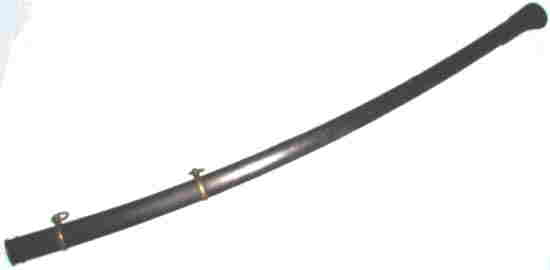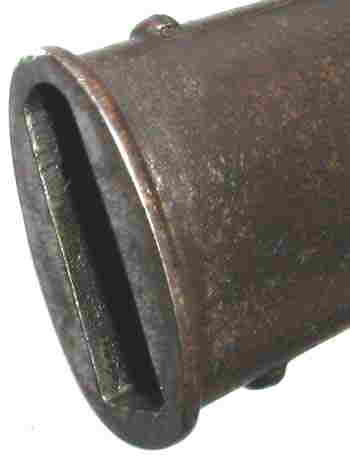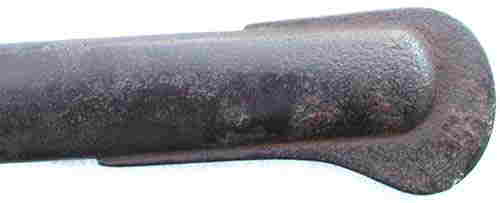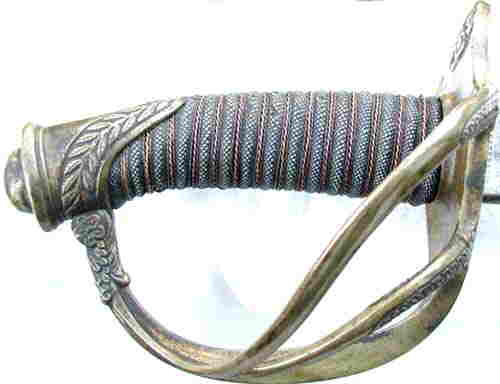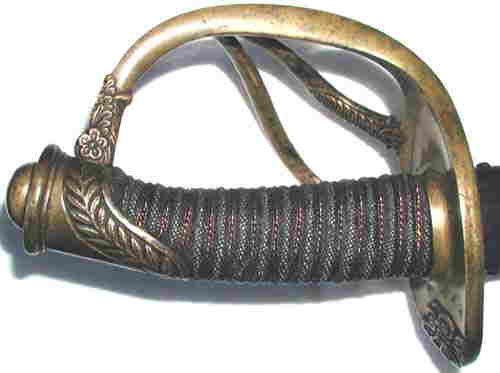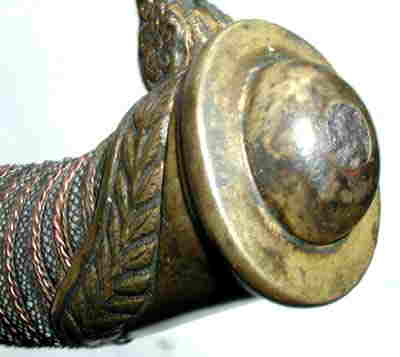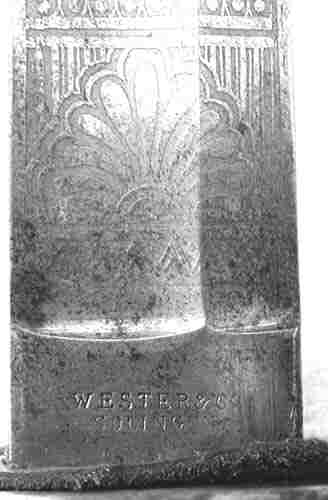|
A
WESTER & COMPANY |
||||
|
OBVERSE VIEW OF A WESTER & COMPANY SABER WITH SCABBARD
|
||||
|
|
||||
|
Wester & Company, Sword Maker - Solingen, Prussia
|
||||
|
Isaac Wester was in business from approximately 1825 to 1883. His
company was a large manufacturer and importer of swords. The featured
sword is marked "WESTER & Co / SOLINGEN" in two lines on
the obverse ricasso. Other Wester markings are WESTER & COMP.
/ SOLINGEN (two lines), WESTER / SOLINGEN (two lines), W & CO
(within a serrated box and separately stamped) and W&C (within
a serrated box or without a box). Wester imported many enlisted cavalry
sabers into the US along with sword components as noted by blades
stamped "W&C" found on some Sauerbier enlisted sabers. Imported
& engraved Model 1840 Wester & Company cavalry officer sabers
appear to be quite rare. I have only seen two that I can remember
and both of them came out of St. Louis, MO. The hilts of these sabers
bear a resemblance to Swiss officer's swords in the incised engraving
at the top of the quillon (forward lip of the cross guard), at the
lower ends of the two guard branches and at the upper knuckle bow.
If it was not for the blade engraving of the American shield, "E PLURIBUS
UNUM" and the large "U S" in lieu of the Swiss cross it would readily
be mistaken for a Swiss cavalry saber. The blued metal scabbard has
brass mountings and rings. The throat and drag of the scabbard are
iron.
|
||||
|
REVERSE VIEW OF SABER AND SCABBARD
|
||||
|
The overall length of the saber is 40" with the
blade being 34-1/4" long with a 5-3/4" hilt. The blade is 1-1/4" wide
by 3/8" thick at the hilt.
|
||||
|
|
||||
|
THE SCABBARD
|
||||
|
The upper brass ring holder band is 11/32" wide.
It is positioned 3" on center from the throat with the lower brass
11/32" ring holder band being 8-1/2" on center from the upper
band. Both brass rings are 5/32" thick and 13/16" inside diameter.
The scabbard is 35" overall from the top of the throat to the tip
of the drag. The tapered 1840 type iron drag is 3-3/4" long and 3/16"
thick at the bottom.
|
||||
|
OBVERSE VIEW OF SCABBARD
|
||||
|
SCABBARD THROAT
|
||||
|
CARRYING RINGS
|
||||
|
DRAG
|
||||
|
|
||||
|
THE HILT
|
||||
|
The hilt has a shark or ray skin covered grip
wound with 2 tightly twisted strands of copper wire centered between
two plain copper strands .
|
||||
|
|
||||
|
OBVERSE & REVERSE VIEWS OF HILT
|
||||
|
The half-basket sweeping incised brass guard
protects the hand in it's entirety. There is no incising on the bottom
of the guard. As mentioned above, there is a heavily incised stylized
engraving on the top of the quillon. The bottom edge of the pommel
cap has leaf style incising. The brim
and tang mound are plain.
|
||||
|
|
||||
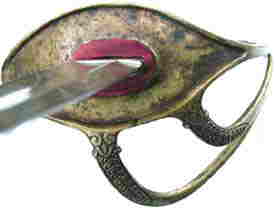 |
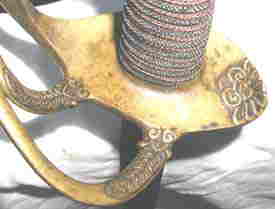 |
|||
|
TOP VIEW OF POMMEL CAP AND QUILLON, BOTTOM VIEW OF FULL HILT AND GUARD
|
||||
|
|
||||
|
THE BLADE
|
||||
|
The curved hatchet tip blade has a 25-3/4" long wide fuller
extending from the ricasso to 8-1/8" from the point. There is also
a median ridge or second narrow fuller along the top of the blade
starting 9" from the ricasso and extending for 16". The false edge
is 10" in length. The largely frosted blade is profusely etched on
the obverse with a lower panel of a stand of arms and shield, a middle
panel of an eagle and 'E PLURIBUS UNUM" in a ribbon, all intermingled
with floral scrolls, and a top sun burst. The reverse has the maker's
name and city at the bottom; WESTER & CO" over "SOLINGEN", and
further up, a shield, an American flag, a large stylized "U.S." and,
military trophies including spears and pikes, with floral and leaf
etching between and above the panels topped by a sunburst design.
|
||||
|
||||
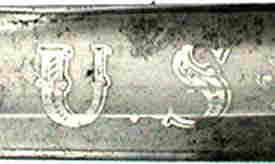
"US"
MARKING
|

HATCHET
TYPE BLADE POINT
|
|||
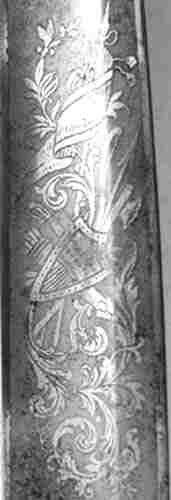
SHIELD
& TROPHIES
|

FLORAL
ENGRAVING & SUNBURST
|
|||

FLAGS,
BANNERS & PIKES
|

FLORAL
ENGRAVING & SUNBURST
|
|||
|
"WESTER &
CO / SOLINGEN" |
||||
|
Reference information for this posting came from "Civil War Cavalry
& Artillery Sabers - A Study of United States Cavalry and Artillery
Sabers, 1833 - 1865" by John H. Thillmann and my personal notes.
John H. Thillmann's book is a recent publication and is, at this
point, the most definitive work on Civil War era Cavalry and Artillery
sabers available to the collector, historian or researcher. It is
educational and can make almost anyone who reads it into an instant
Civil War saber expert. It is strongly recommended for anyone having
an interest in swords to add this book to their collection. You
will not be sorry. All photographs are originals of mine. Any assumptions or errors in this posting are my responsibility only. Dave Radcliffe |
||||


